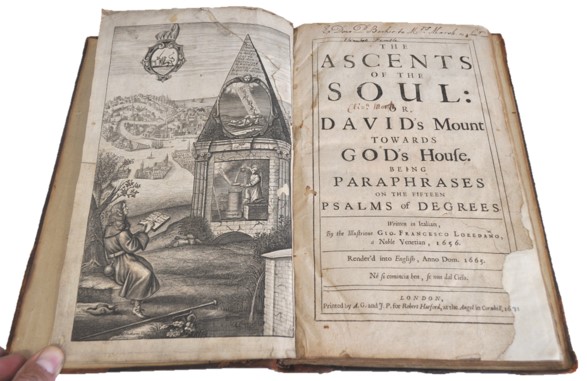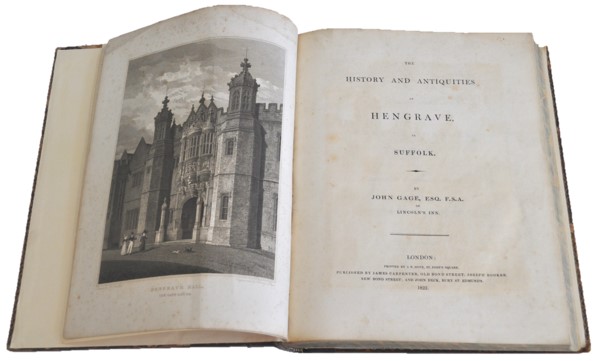Larks Hill Library
 We are pleased to offer the selected contents of the library from Larks Hill, Tuddenham, including volumes from the 17th century onwards, many being Suffolk and Ecclesiastical history related.
We are pleased to offer the selected contents of the library from Larks Hill, Tuddenham, including volumes from the 17th century onwards, many being Suffolk and Ecclesiastical history related.
Larks Hill is a beautiful Tudor style property in Suffolk, from within which we have been privileged to collect a large consignment for sale. As befits a property of this scale, the library is especially impressive, and we have been steadily researching the volumes in preparation for auction.
A small selection of the books we have catalogued so far are shown below.
One of the earliest volumes amongst the collection is a 1665 4th edition of Sir Richard Baker's Chronicle of the Kings of England from the Time of the Romans’ Government unto the Death of King James. Baker was knighted by James I in 1620 and acted as high sheriff in Oxfordshire where he owned some property. However, he sank into poverty due to debts owed by his wife's family and was confined in the Fleet Prison until his death in 1645. Baker spent much of his imprisonment writing and this became his most famous work.
Whilst the book was originally published in 1643 (the second year of the First English Civil War), this, the 4th edition, overlapped into the Restoration of the Monarchy and therefore contains additions chronicling the reign of the ill-fated Charles I and the "most Happy and Wonderful RESTAURATION" of Charles II.
The collection includes further royal related and biographical tomes such as Joshua Barnes' The History of That Most Victorious Monarch Edward III, published in 1688, and Richard Fiddes' The Life of Cardinal Wolsey 1724 first edition.
A volume which caused a furore upon its publication was Horace Walpole's Historic Doubts on the Life and Reign of King Richard III because it dared to question the Shakespearean portrayal of Richard III as an outright villain. He claimed that the crimes ascribed to Richard, including the murder of his own nephews 'The Princes in the Tower', were not only unlikely but also contrary to Richard's own interests. As we know, this is an historical argument which has continued to this day and only increased in vehemence upon the discovery of Richard's remains a few years ago.
More recent volumes include two first editions by John Gage; The History and Antiquities of Hengrave in Suffolk published in 1822, and The History and Antiquities of Suffolk Thingoe Hundred from 1838. John Gage Rokewode was a historian and antiquarian descended from the wealthy Suffolk Catholic families of the Gages and the Rookwoods. The Rookwoods boasted a failed Gunpowder Plotter and Jacobite conspirator amongst their ancestors, while the Gage's of Hengrave Hall hosted Tudor queens and supported Charles I during the English Civil War. By John Gage Rokewode's time anti-papist feeling had thankfully abated and he was able to devote himself to studying law and antiquarian pursuits.
Further local history is also to be found Walter Arthur Coppinger's seven volume collection of the Manors of Suffolk, and many notable 19th century topographical and historical guides from Edmund Gillingwater and Rev. Alfred Inigo Suckling amongst others.
A large part of the collection is formed of ecclesiastical works and religious biography. An interesting and rare inclusion is the 1737 edition of the Boyle Lectures; A Defence of Natural and Revealed Religion, which were funded from an endowment by scientist, yet devout Anglican, Robert Boyle. These 'sermons' were intended for scientists, theologians and natural philosophers to disprove atheism and heal the growing schism between science and religion. This collated selection of sermons was published by Gilbert Burnet (vicar of Coggeshall in Essex, not the famous philosopher Bishop) and includes works by Dr Richard Bentley, Richard Kidder, and Francis Gastrell (Bishop of Chester and friend of Jonathan Swift).
Another early religious publication is Giovanni Francesco Loredano's The ascents of the soul, or, David's mount towards God's house being paraphrases on the fifteen Psalms of Degrees, which was translated by Hugh Hare Baron Coleraine and posthumously published by his widow in 1681. Song of Ascents is a title given to fifteen of the Psalms which begin with the Hebrow words Shir Hama'aloth and many believe to mean pilgrim songs (i.e. ascending the road to Jerusalem to attend pilgrim festivals). The frontispage below was engraved by William Fairthorne, and represents Coleraine in pilgrim's garb before a monument depicting Jacob's Ladder with angels ascending.

This is a fascinating collection containing many rare and intriguing volumes of academic interest, with a particular focus on history and religion. As we continue working through this library, we will add preview details prior to the auction.






